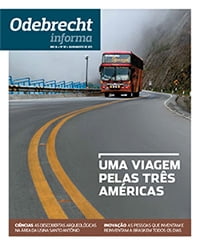Edition 167 – At the core of a Philosophy
Twenty-five years ago, the Odebrecht Foundation made youth the focus of its operations
1 de August de 2013
Twenty-five years ago, the Odebrecht Foundation made youth the focus of its operations
1 de August de 2013

A love for the land has always been part of life for Edivan Alcântara, 22. The youngest of five siblings, he was the only one to stay in the countryside, along with his parents. “I’ve always dreamed of making a living from farming,” says the resident of the Alto da Prata community in the town of Presidente Tancredo Neves, BA. He has no regrets.

Edivan says that his family’s encouragement and a calling to work the land were the factors that motivated him to enroll at the President Tancredo Neves Rural Family House (CFR-PTN) in 2008. He took a three-year technical qualification course in Agriculture and learned about farm management, cooperatives, soil management, irrigation, drainage and a variety of crops. “I studied and put what I learned into practice. In family farming, we are the owners of our own business,” he argues.
During the second year of the course, Edivan carried out his first productive educational project: 0.4 hectares of banana trees planted on his family’s small farm. That activity is part of the training the Family House offers with the support of the Tribute to the Future program, which funds activities certified by the Odebrecht Foundation through allocations of income tax owed by Odebrecht Group members. “My second production project was in the CFR-PTN’s top 10. With the profits from those crops, I made enough money to buy a piece of land. So I’ve grown as a farmer.”
Edivan became an assistant teacher at the President Tancredo Neves Rural Producers’ Cooperative (Coopatan) and CFR-PTN, institutions linked to the Growth Program with Sustainability for the Southern Bahia Lowlands Environmental Protection Areas Mosaic (PDCIS), an initiative developed by the Odebrecht Foundation and partners from the public and private sectors. “I help young students and cooperative members develop their crops,” he says.
Despite all these achievements, the young man still faced a challenge – the shortage of land on his family’s farm, which had forced his siblings to leave the countryside. “They couldn’t find any opportunities here.” But things have been different for Edivan. In 2013, an initiative of the CFR-PTN, in partnership with Coopatan, which is also associated with the school, enabled him to acquire land and expand his crops. Through the Land Access Fund, a pilot project that provides financial assistance to small farmers, he and six other young people are receiving the aid they need to implement agricultural projects so they can make a living from the income generated in the countryside.
“’I’ve fulfilled the dream of expanding my farm to 20 hectares,” says Edivan, a rural entrepreneur who plans to double his income in a year. Today he makes BRL 1,300.00 per month. He firmly believes that working alongside his parents and on his own property is the way to go. “Getting where I want to go just depends on me.”
Youth Protagonism
Stories like Edivan’s reinforce the ethos of the Odebrecht Foundation’s mission, which made young people the focus of its activities 25 years ago. The decision to work with youths instead of for them, viewing them as part of the solution and not as a problem, was later conceptualized, systematized and called Youth Protagonism, a philosophy that is now a legacy of the Third Sector.
“One of our pillars is the awareness that the family is the mother cell of the production of society’s moral and material wealth, and that within it, young people act as agents of change,” says Mauricio Medeiros, the Foundation’s Executive President.
Taisa da Luz, 17, believes that too. A student at the Agroforestry Family House (CFAF), where she is completing a technical course in forestry that is integrated with the regular high school curriculum, she has found a way to change her future prospects. “We are transforming something that nature gives us to generate jobs and income,” says the resident of the Jatimane maroon community in Nilo Peçanha, Bahia. “The future is what we’re doing now,” she adds.
She is participating in the Jewels of the Quilombo project, supported by the Oi Futuro Institute, taking on the challenge of making earrings, necklaces, rings and bracelets from coconut palm fiber. She learned the craft techniques from qualified instructors trained by the Pratigi Environmental Protection Area Rural Producers’ Cooperative (Cooprap), in partnership with the Mauá Institute. CFAF and Cooprap are also part of the PDCIS. “We can always learn new things. Opportunities need to be created.”
Davison Silva, 15, is following Edivan’s and Taisa’s example. He began studying at the Igrapiúna Rural Family House in 2013. Also part of the PDCIS, that educational unit teaches methods of developing crops that Davison already grows along with his father. “I consider myself a farmer, and I’m going to study so I can use all my knowledge,” emphasizes the resident of the Domingos Cruz community in Camamu county.
His father, Antonio da Silva, 38, believes in this partnership. “I have the practical know-how and he has technical know-how. Davison is learning and teaching me a lot. He convinced me to stop using chemical fertilizer,” he says. Davison dreams of becoming a role model for his region, just like Edivan. “I want to be of service to the countryside.”
Do you wish to be
a partner in our projects, make
a donation or hire our technical consulting?
Send a message
right now!